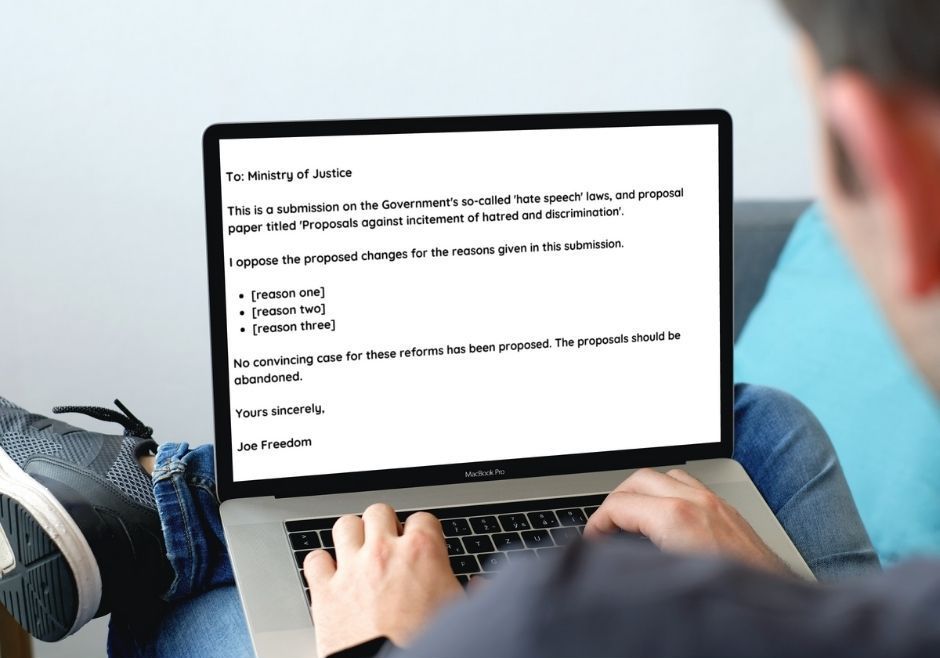Get Started!
INSTRUCTIONS – HOW TO USE THIS TEMPLATE:
-
Copy and paste the template email into your own email (to email) or Word document (if sending by mail – allow time for post).
-
Choose 3+ points from the bullet points below and add them to your draft email or Word document.
-
Add any other points you wish.
-
SEND BY EMAIL TO: [email protected]
-
OR SEND BY POST TO: Human Rights, Ministry of Justice, SX10088, Wellington

Your Email Template:
To: Ministry of Justice
This is a submission on the Government’s so-called ‘hate speech’ laws, and proposal paper titled ‘Proposals against incitement of hatred and discrimination’.
I oppose the proposed changes for the reasons given in this submission.
-
[reason one]
-
[reason two]
-
[reason three]
No convincing case for these reforms has been proposed. The proposals should be abandoned.
Yours sincerely,
[your name]
[your email]
Bullet Points To Choose From:
The proposals are dangerously vague and unworkable.
-
It is impossible to adequately define “hatred”, let alone attempting to define what it is to incite or stir up hatred or maintain or normalise hatred.
-
The test of what constitutes “hatred” is a subjective one. New Zealanders will be in a position of not knowing which words will be deemed illegal.
-
There will be a clear chilling effect on society as people bite their tongues for fear of breaching ambiguous provisions, the scope of permissible speech narrows. This is undoubtedly an egregious result in a democratic and free society.
-
There will always be bigots who say things others find offensive. There will also be people holding strong beliefs others find offensive. We may consider particular statements and opinions upsetting or even repulsive, but our feelings don’t warrant these beliefs being made illegal.
-
Participation in a particular group should not afford individuals with special rights, nor remove the ability of others to hold opinions, whatever they may be, about that group. Who deems which groups get special protection? Who decides what is and isn’t an acceptable view? These seem to be considerations best addressed by public discussion, not by laws imposing hefty penalties.
-
There is no defence of “truth”. The implications for this are alarming: if a statement is true, its utterance could lead to imprisonment if a defined group deems it is offended.
The proposed penalties are completely inappropriate.
-
It is ridiculous to manage insulting behaviour like intentionally threatening to harm someone or anything like an actual physical assault. Imprisonment should never be a penalty for insulting speech.
-
Attaching drastic monetary penalties and lengthy prison time to hate speech legislation is extreme. We should scrap all prison penalties and reject the new excessive and unreasonable fines.
The proposals are very unlikely to resolve or even curb discrimination.
-
Pushing ahead with hefty penalties for “hate speech” will not stop bigotted, discriminatory or even hateful sentiment in New Zealand. People determined to cause hate and division will not be perturbed by new laws and will continue no matter the consequences.
-
The bolstering of hate speech laws is more likely to cause regular New Zealanders to walk on eggshells, bite their tongues, and potentially end up in Court for uttering an unfavourable but honest opinion.
-
Implementation of any, let alone stronger hate speech laws, doesn’t address underlying issues that might lead to “hateful” speech in the first place. In the end, rather than protecting the feelings of New Zealanders and making them feel safe, providing special rights to selective groups will cause division in society. At the same time, will people struggle to know what to say or even think, and resentment will brew, making everyone feel less safe, less included and less free.
The solution to bad speech is more speech.
-
Section 14 of the New Zealand Bill of Rights Act 1990 protects freedom of expression. This includes the freedom to seek, receive and impart information and opinions of any kind, in any form. A robust interpretation must apply to this fundamental freedom.
-
Rather than censor what New Zealanders say, we would do better to encourage more healthy debate on confronting issues. Banning speech doesn’t eradicate it. It drives it underground. While we may temporarily run the risk of offence, the best solution to bigotted ideas is to discuss why they are undesirable.
-
The best solution to new concepts that worry people is talking about them and working out how we want to manage them together. In this way, New Zealanders will not only become more resilient, but they’ll also become more empathetic, wiser and retain their precious freedoms.
